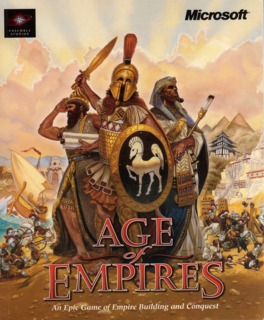Friends of simple strategy and history will love this.
-What it is
An old real time strategy game that takes place in the antiquity and started a famous franchise.
-What you do
The campaign is divided into four parts: the Egyptians (which also serves as a tutorial), the Greeks, the Babylonians and the Japanese.
You use villagers to gather resources (food, wood, gold, stone), erect buildings (barracks, granaries, docks, temples...) and make repairs. Buildings allow you to train military units (infantry, archers, cavalry, siege weapons, priests), construct ships or research technologies that greatly increase your power: villagers walk faster, farms produce more food, troops acquire better armor, etc. Military units and war boats have different characteristics (production cost, attack range, damage, hit points, line of sight, speed) and need to be used accordingly. If you collect enough resources you can move to a new age (there are four in total: stone, tool, bronze, iron), thus you gain access to new technologies and better units.
Winning usually requires to destroy your enemy but the circumstances vary greatly: the level's geography (forests, rivers, islands, natural resources), the location of you and the computer, your starting forces, etc. Furthermore, in some missions your goal is to capture a number of artifacts or win without producing units, so you have to play differently.
-How you do it
The control is simple, practical and easy to learn. You left click to select an object, right click to perform an action with it. For example, when you select a villager you see at the bottom of the screen the types of buildings he can create and the materials required. If you right click at a tree he will start chopping wood and take it to the nearest storehouse.
-The good
The campaign is long and several missions can be played in more than one way. Music is relaxing and the sound effects are convincing. The interface icons are well drawn and the villagers' animation is detailed. There is rich historical information presented between missions and in the manual. Most of all, there is a sense of accomplishment when you finish a difficult level.
-The bad
Different civilizations share almost the same units, e.g. the Japanese have hoplites instead of samurais! There is no speech. Some missions are stuffed with enemies and become tiresome. Your units aren't smart: they block each other's way, there is 'friendly fire' from your catapults, etc. Also, I encountered a bug that corrupted my saves.
-Tips
Prioritize your moves. Collect resources to build a small but efficient defence force quickly. Don't waste gold. Remember that the computer targets your most vulnerable units. Make good use of your ships (very versatile), priests (heal your wounded or convert enemies to fight at your side, especially cavalry) and catapults (demolish towers). Don't let enemy transport boats unload their troops. And finally, attack the computer's territory carefully, he often has a lot of reinforcements standing by.
-Conclusion
Technically, Age of Empires is very dated, however it has aged well. Personally, I enjoyed its simplicity, especially not having to fight many battles at the same time. If you want a real time strategy game without many things to memorize and units to control, then you shoud try it. It's a classic.
Graphics 6,5
Sound 6
Control 7,5
Gameplay 7,5
Total 7

